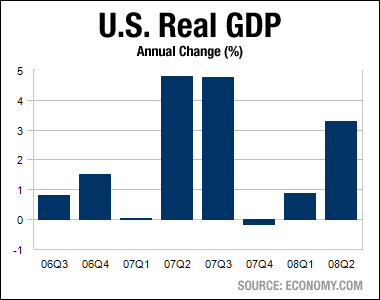Thin-Skinned Wallets
Things aren't that bad; why all the hollering?
-
Tools:
Most every elementary-school classroom has a kid who is thin-skinned. Not in the sense of being unable to take insults without crying; that's another story.
The thin-skinned child is the one who bruises at the slightest touch; who can't fall down in the playground without getting scratches that bleed copiously; who, in short, doesn't seem to have been granted the physical strength and fortitude to deal well with even the mildest misfortune. Such a child generally winds up sitting alone on the schoolhouse steps, watching the others play; for who wants to get blamed for "hurting poor Billy again"?
It looks like today's Americans are as financially thin-skinned as poor Billy on the playground. From the yelling and screaming of the last year, you'd think we were in the second Great Depression; in fact, the media routinely alleges exactly that. An endless drumbeat of financial crises, layoffs, cutbacks, insecurity, and so on might lead you to believe that the End Is Nigh.
It's true that, as Rasmussen polls show, half of American voters believe the media is intentionally making the economy look worse than it really is. But surely it isn't entirely made up, is it?
After all, housing prices are dropping; banks are failing; and tax revenues are down. Doesn't that mean economic problems?

No. Not in the least. There is one official means of determining a recession, and another method that isn't "official" but is realistic.
The official definition of a recession is simple and straightforward:
A period of general economic decline; specifically, a decline in GDP for two or more consecutive quarters. [emphasis added]
So it's very easy to discern whether we are, in fact, in a recession. National Review and Economy.com have provided this excellent graph of America's changing GDP over the last while.
It's very clear that in the last two years, we have had exactly one quarter with a declining GDP, and that by a tiny amount; all the other quarters have shown growth, mostly pretty significant growth. We are not in a depression; we are not in a recession; we are, in fact, in a growing economy.
Could it be growing more? Of course it could, and it would if the government would reduce taxes and cut burdensome regulation. All things considered, though, and especially considering the quadrupling of oil prices we've had to sustain, the American economy is robustly healthy.
The other unofficial but highly relevant measure of economic health is that of unemployment. As the old saw has it, a recession is when your neighbor loses his job but a depression is when you lose yours. So, how are we doing as far as putting people to work?
Not so bad. The U.S. Department of Labor reports that the July unemployment rate was 5.7%. That's a bit more than last year at this time (4.7%), and obviously we should be concerned about the unlucky people that represent that percent.
However, in a free economy there will always be a certain number of people that are in between jobs. The only time you'll get truly 100% employment is if it's illegal to quit, and that's not really where we want to be.
Economists write that, as a practical matter, "full employment" is represented by an unemployment rate of somewhere between 4.3% and 7.3%; so we're well within the safety zone. Early reports for August show another increase to 6.1%; historically, the early results are frequently adjusted down. But even if they aren't, we are still within the range of theoretical "full employment."
Compare this to the Great Depression, when the unemployment rate was 25% - and that was in a day when, mostly, it was just the husbands who worked, so that was 25% of families with no income whatsoever. Today's unemployment rates include a lot of people who have lost their jobs but their spouses still are working; still not fun, but a far cry from the total poverty of the Depression.
There are definitely adjustments that ought to be made to improve our economy. Nobody is arguing that things are just perfect exactly as we have them now. But what possible justification is there for the panic and fear being spread on every side?
The fact is, we haven't had a really tough recession since the 1970s; most of today's workers weren't even alive then, or weren't employed themselves. The early 80s had a sharp recession, but it was very brief; since then, what we've called "recessions" (rightly or wrongly) have been, by historical standards, extremely mild.
American wallets seem to be unable to put up with the slightest stress, or even a stiff breeze. That is more serious cause for concern than any real economic numbers we see at the moment. If people are screaming that you're chopping off their leg when all they have is a hangnail, woe betide them if something really bad ever happens.
-
Tools:
What does Chinese history have to teach America that Joe Biden doesn't know?


Didn't Reagan have some success trimming bureaucracy?